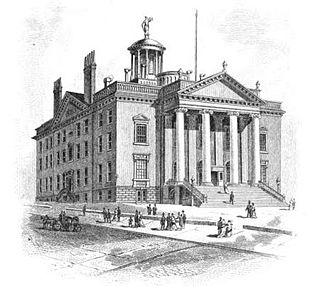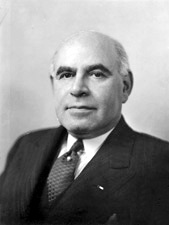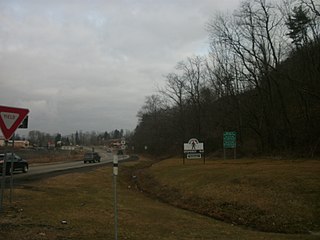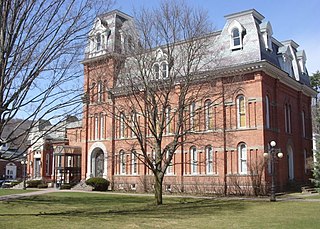Life
He was the son of Dr. Thaddeus Mather (1778–1854) and Sarah (Parker) Mather. In 1837, he married Alva Porter.
At the New York state election, 1847, he ran for Canal Commissioner on the Democratic and Anti-Rent tickets, but was defeated. At the New York state election, 1850, he ran again, on the Democratic ticket, and was elected, remaining in office from 1851 to 1853. In July 1853, he was impeached by the New York State Assembly, but was acquitted by the Court for the Trial of Impeachments. At the New York state election, 1853, he ran for re-election on the Hard ticket, but was defeated by Whig Cornelius Gardinier.
The Commission to Explore a Route for a Canal to Lake Erie and Report, known as the Erie Canal Commission, was a body created by the New York State Legislature in 1810 to plan the Erie Canal. In 1817 a Canal Fund led by Commissioners of the Canal Fund was established to oversee the funding of construction of the canal. In 1826 a Canal Board, of which both the planning commissioners and the Canal Fund commissioners were members, was created to take control of the operational canal. The term "Canal Commission" was at times applied to any of these bodies. Afterwards the canal commissioners were minor state cabinet officers responsible for the maintenance and improvements of the state's canals.

The Anti-Rent War was a tenants' revolt in upstate New York in the period 1839–1845. The Anti-Renters declared their independence from the manor system run by patroons, resisting tax collectors and successfully demanding land reform.
He was a member of the New York State Senate (4th D.) in 1858 and 1859.

The New York State Senate is the upper house of the New York State Legislature. There are 63 seats in the Senate, and its members are elected to two-year terms. There are no term limits.

The 81st New York State Legislature, consisting of the New York State Senate and the New York State Assembly, met from January 5 to April 19, 1858, during the second year of John A. King's governorship, in Albany.

The 82nd New York State Legislature, consisting of the New York State Senate and the New York State Assembly, met from January 4 to April 19, 1859, during the first year of Edwin D. Morgan's governorship, in Albany.
In 1869, he married Helen Goulding.
State Senator Francis M. Bixby (born 1828) was his nephew.
Francis Mather Bixby was an American politician from New York.

There have been 90 gubernatorial elections in the state of New York since 1777. The next one will be held on November 3, 2022.
Levi Starr Chatfield was an American lawyer and politician.

The 1962 New York state election was held on November 6, 1962, to elect the Governor, the Lieutenant Governor, the State Comptroller, the Attorney General, a judge of the New York Court of Appeals and a U.S. Senator, as well as all members of the New York State Assembly and the New York State Senate.

The 1936 New York state election was held on November 3, 1936, to elect the Governor, the Lieutenant Governor, the State Comptroller, the Attorney General, a judge of the New York Court of Appeals and two U.S. Representatives-at-large, as well as all members of the New York State Assembly and the New York State Senate.

The 1934 New York state election was held on November 6, 1934, to elect the Governor, the Lieutenant Governor, the State Comptroller, the Attorney General, a U.S. Senator, two U.S. Representatives-at-large, the Chief Judge and two associate judges of the New York Court of Appeals, as well as all members of the New York State Assembly and the New York State Senate.

The 1902 New York state election was held on November 4, 1902, to elect the Governor, the Lieutenant Governor, the Secretary of State, the State Comptroller, the Attorney General, the State Treasurer, the State Engineer and a judge of the New York Court of Appeals, as well as all members of the New York State Assembly and the New York State Senate.

The 1900 New York state election was held on November 6, 1900, to elect the Governor, the Lieutenant Governor, the Secretary of State, the State Comptroller, the Attorney General, the State Treasurer and the State Engineer, as well as all members of the New York State Assembly and the New York State Senate.

The 1856 New York state election was held on November 4, 1856, to elect the Governor, the Lieutenant Governor, a Canal Commissioner, an Inspector of State Prisons and the Clerk of the Court of Appeals, as well as all members of the New York State Assembly.

The 1860 New York state election was held on November 6, 1860, to elect the Governor, the Lieutenant Governor, a Canal Commissioner, and an Inspector of State Prisons, as well as all members of the New York State Assembly. Besides, the question of Negro suffrage was asked, and was answered in the negative with 197,503 votes for and 337,984 against it.

The 1874 New York state election was held on November 3, 1874, to elect the Governor, the Lieutenant Governor, a judge of the New York Court of Appeals, a Canal Commissioner and an Inspector of State Prisons, as well as all members of the New York State Assembly and one member of the New York State Senate.

The 1876 New York state election was held on November 7, 1876, to elect the Governor, the Lieutenant Governor, a judge of the New York Court of Appeals, a Canal Commissioner and an Inspector of State Prisons, as well as all members of the New York State Assembly and two members of the New York State Senate. Besides, two constitutional amendments were proposed - to abolish the elected Canal Commissioners and appoint a Superintendent of Public Works instead; and to abolish the elected New York State Prison Inspectors and appoint a Superintendent of State Prisons instead - and both were accepted by the electorate.
Gideon John Tucker was an American lawyer, newspaper editor and politician. In 1866, as Surrogate of New York County, he wrote in a decision of a will case: "No man's life, liberty or property are safe while the Legislature is in session."
Marshall Bolds Champlain was an American lawyer and politician.

Alexander Smith Johnson was an American lawyer and politician from New York. He was Chief Judge of the New York Court of Appeals from 1858 to 1859.

George Franklin Comstock was an American lawyer and politician. He was Chief Judge of the New York Court of Appeals from 1860 to 1861.
Cornelius Gardinier was an American politician from New York.
Francis Seger was an American lawyer and politician from New York.

The 76th New York State Legislature, consisting of the New York State Senate and the New York State Assembly, met in Albany from January 4 to July 21, 1853, during the first year of Horatio Seymour's governorship.
Ebenezer Blakely was an American lawyer and politician from New York.
Jarvis Lord, was an American politician from New York.












